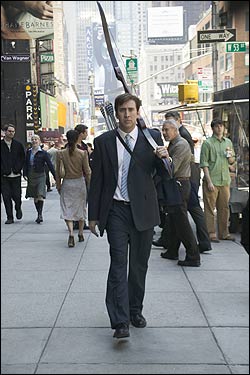If you think Nicolas Cage’s decision to marry Elvis Presley’s daughter was stupid, get a load of his idea of getting over their whirlwind divorce: Make a movie about a dumb celebrity loser whose wife divorces him. “I thought it might be a way for me to work through those feelings, and as corny as it might sound, it helped,” he told The Detroit Free Press.
I’m glad Cage feels better, but I want a movie to make me feel better because it works artistically. The Weather Man doesn’t work. It reminds me of Elizabethtown, a thoughtful, sensitive movie with fine actors, deeply human characters, some tremulously effective scenes, and a terrible pointlessness. It’s much slower, though—a 45 played at 33 1/3. The script by Steven Conrad (Wrestling Ernest Hemingway) has a faux-literary quality, which explains why director Gore Verbinski chose to make it before making another kabillion for the two Pirates of the Caribbean sequels.
The result is glossy and handsome, but the tale doesn’t deserve the loving care of its telling. Cage plays a disconsolate star weatherman in Chicago named David Spritz. His world is wonderful as long as he’s between the green screen and the camera lens, but his real life sucks. For reasons not convincingly explained, TV viewers are forever pelting him with soft drinks and fast food, which splatter his pricey clothes in slow motion. His ex-wife (Hope Davis) splatters his ego. She justifiably divorced him for never, ever listening to her, and the resigned, exasperated contempt in her eyes is convincingly piercing. He keeps idiotically imagining they might get back together and doing socially maladroit things that guarantee they won’t.
And she’s the least of his problems. His teenage son (Nicholas Hoult) is undergoing counseling for pot possession with a creep (Gil Bellows, effectively sinister as a wanna-be pedophile). His glum, plump, clumsy lump of a tweener daughter (Gemenne de la Peña) is as passive as a rock. Finally, David’s dad (Michael Caine) is a famous writer and insufferable nudge, a pushy Polonius endlessly hectoring David to grow up. This despite the fact that David’s being courted by Bryant Gumbel’s big show in New York, which kind of defeats the argument.
The Gumbel gig is supposed to provide a sense of story climax, but doesn’t. David’s various family problems remain unresolved. Nobody changes. Nothing of interest happens. The movie looks good, and evokes realistic emotions, but goes nowhere slow. It’s commendable that films lately have gotten so interested in failures, giving us a respite from the standard surfeit of cookie-cutter heroes overcoming obstacles. But just because you’ve got a great actor successfully portraying a failure doesn’t mean your movie can’t be a big, boring flop. (R)








